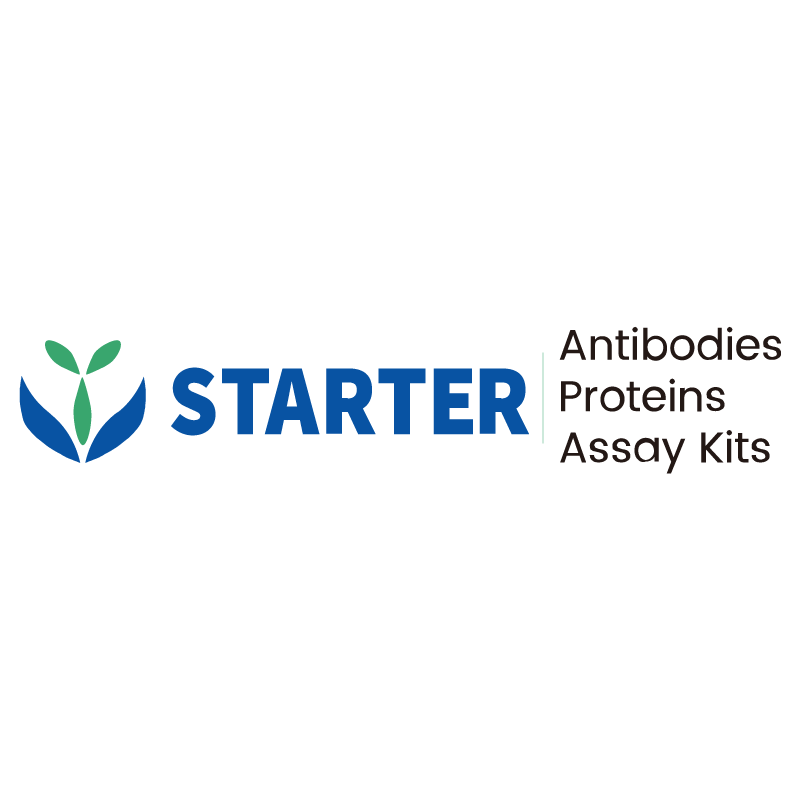WB result of UCHL1 Rabbit pAb
Primary antibody: UCHL1 Rabbit pAb at 1/10000 dilution
Lane 1: SH-SY5Y whole cell lysate 20 µg
Lane 2: HEK-293 whole cell lysate 20 µg
Secondary antibody: Goat Anti-rabbit IgG, (H+L), HRP conjugated at 1/10000 dilution
Predicted MW: 25 kDa
Observed MW: 25 kDa
Product Details
Product Details
Product Specification
| Host | Rabbit |
| Antigen | UCHL1 |
| Synonyms | Ubiquitin carboxyl-terminal hydrolase isozyme L1; Neuron cytoplasmic protein 9.5; PGP 9.5 (PGP9.5); Ubiquitin thioesterase L1 |
| Immunogen | Recombinant Protein |
| Location | Cytoplasm, Endoplasmic reticulum membrane |
| Accession | P09936 |
| Antibody Type | Polyclonal antibody |
| Isotype | IgG |
| Application | WB, IHC-P, ICC, IF |
| Reactivity | Hu, Ms, Rt |
| Positive Sample | SH-SY5Y, HEK-293, Neuro-a, mouse brain, PC-12, rat brain |
| Purification | Immunogen Affinity |
| Concentration | 0.5 mg/ml |
| Conjugation | Unconjugated |
| Physical Appearance | Liquid |
| Storage Buffer | PBS, 40% Glycerol, 0.05% BSA, 0.03% Proclin 300 |
| Stability & Storage | 12 months from date of receipt / reconstitution, -20 °C as supplied |
Dilution
| application | dilution | species |
| WB | 1:10000 | Hu, Ms, Rt |
| IHC-P | 1:500 | Hu, Ms, Rt |
| ICC | 1:500 | Hu |
| IF | 1:500 | Ms |
Background
UCHL1 (Ubiquitin C-terminal Hydrolase L1) is a brain-specific deubiquitinating enzyme that plays a crucial role in various cellular processes. It is highly expressed in the brain and spinal cord neurons and is essential for maintaining proper UPS (Ubiquitin-Proteasome System) functions. It hydrolyzes free monoubiquitin from ubiquitinated proteins for recycling, ligates ubiquitin into specific proteins for proteasomal degradation, and binds to free monoubiquitin to maintain an available ubiquitin pool. UCHL1 is involved in the clearance of abnormal protein aggregates and is closely associated with several neurodegenerative diseases and CNS trauma. UCHL1 activity can protect neurons from hypoxic damage. After a stroke, reactive lipids bind to cysteine 152 (C152) of UCHL1, causing the protein to unfold and lose its function. UCHL1 is indispensable for axonal maintenance and integrity. Mutations in the UCHL1 gene in humans can lead to progressive early-onset neurodegeneration. Furthermore, UCHL1 has been implicated in various cancers, including pancreatic, colorectal, and breast cancer, where it can promote cancer invasion and metastasis . It interacts with signaling pathways such as TGF-β and hypoxia signaling, which are important for cancer progression and metastasis.
Picture
Picture
Western Blot
WB result of UCHL1 Rabbit pAb
Primary antibody: UCHL1 Rabbit pAb at 1/10000 dilution
Lane 1: Neuro-a whole cell lysate 20 µg
Lane 2: mouse brain lysate 20 µg
Secondary antibody: Goat Anti-rabbit IgG, (H+L), HRP conjugated at 1/10000 dilution
Predicted MW: 25 kDa
Observed MW: 25 kDa
WB result of UCHL1 Rabbit pAb
Primary antibody: UCHL1 Rabbit pAb at 1/10000 dilution
Lane 1: PC-12 whole cell lysate 20 µg
Lane 2: rat brain lysate 20 µg
Secondary antibody: Goat Anti-rabbit IgG, (H+L), HRP conjugated at 1/10000 dilution
Predicted MW: 25 kDa
Observed MW: 25 kDa
Immunohistochemistry
IHC shows positive staining in paraffin-embedded human cerebral cortex. Anti-UCHL1 antibody was used at 1/500 dilution, followed by a HRP Polymer for Mouse & Rabbit IgG (ready to use). Counterstained with hematoxylin. Heat mediated antigen retrieval with Tris/EDTA buffer pH9.0 was performed before commencing with IHC staining protocol.
IHC shows positive staining in paraffin-embedded human colon. Anti-UCHL1 antibody was used at 1/500 dilution, followed by a HRP Polymer for Mouse & Rabbit IgG (ready to use). Counterstained with hematoxylin. Heat mediated antigen retrieval with Tris/EDTA buffer pH9.0 was performed before commencing with IHC staining protocol.
IHC shows positive staining in paraffin-embedded human testis. Anti-UCHL1 antibody was used at 1/500 dilution, followed by a HRP Polymer for Mouse & Rabbit IgG (ready to use). Counterstained with hematoxylin. Heat mediated antigen retrieval with Tris/EDTA buffer pH9.0 was performed before commencing with IHC staining protocol.
IHC shows positive staining in paraffin-embedded mouse cerebral cortex. Anti-UCHL1 antibody was used at 1/500 dilution, followed by a HRP Polymer for Mouse & Rabbit IgG (ready to use). Counterstained with hematoxylin. Heat mediated antigen retrieval with Tris/EDTA buffer pH9.0 was performed before commencing with IHC staining protocol.
IHC shows positive staining in paraffin-embedded rat cerebral cortex. Anti-UCHL1 antibody was used at 1/500 dilution, followed by a HRP Polymer for Mouse & Rabbit IgG (ready to use). Counterstained with hematoxylin. Heat mediated antigen retrieval with Tris/EDTA buffer pH9.0 was performed before commencing with IHC staining protocol.
Immunocytochemistry
ICC shows positive staining in SH-SY5Y cells. Anti- UCHL1 antibody was used at 1/500 dilution (Green) and incubated overnight at 4°C. Goat polyclonal Antibody to Rabbit IgG - H&L (Alexa Fluor® 488) was used as secondary antibody at 1/1000 dilution. The cells were fixed with 4% PFA and permeabilized with 0.1% PBS-Triton X-100. Nuclei were counterstained with DAPI (Blue). Counterstain with tubulin (Red).
Immunofluorescence
IF shows positive staining in paraffin-embedded mouse cerebral cortex. Anti- UCHL1 antibody was used at 1/500 dilution (Green) and incubated overnight at 4°C. Goat polyclonal Antibody to Rabbit IgG - H&L (Alexa Fluor® 488) was used as secondary antibody at 1/1000 dilution. Counterstained with DAPI (Blue). Heat mediated antigen retrieval with EDTA buffer pH9.0 was performed before commencing with IF staining protocol.


